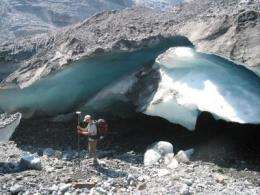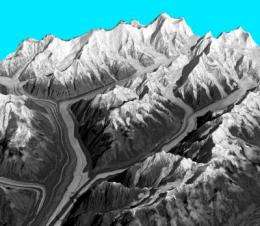Research team breaks the ice with new estimate of glacier melt

The melting of glaciers is well documented, but when looking at the rate at which they have been retreating, a team of international researchers steps back and says not so fast.
Previous studies have largely overestimated mass loss from Alaskan glaciers over the past 40-plus years, according to Erik Schiefer, a Northern Arizona University geographer who coauthored a paper in the February issue of Nature Geoscience that recalculates glacier melt in Alaska.
The research team, led by Étienne Berthier of the Laboratory for Space Studies in Geophysics and Oceanography at the Université de Toulouse in France, says that glacier melt in Alaska between 1962 and 2006 contributed about one-third less to sea-level rise than previously estimated.
Schiefer said melting glaciers in Alaska originally were thought to contribute about .0067 inches to sea-level rise per year. The team's new calculations put that number closer to .0047 inches per year. The numbers sound small, but as Schiefer said, "It adds up over the decades."
While the team looked at three-fourths of all the ice in Alaska, Schiefer noted, "We're also talking about a small proportion of ice on the planet. When massive ice sheets (such as in the Antarctic and Greenland) are added in, you're looking at significantly greater rates of sea-level rise."
Schiefer said the team plans to use the same methodologies from the Alaskan study in other glacial regions to determine if further recalibrations of ice melt are in order. These techniques use satellite imagery that spans vast areas of ice cover.
Previous methods estimated melt for a smaller subset of individual glaciers. The most comprehensive technique previously available used planes that flew along the centerlines of selected glaciers to measure ice surface elevations. These elevations were then compared to those mapped in the 1950s and 1960s. From this, researchers inferred elevation changes and then extrapolated this to other glaciers.

Two factors led to the original overestimation of ice loss with this method, Schiefer said. One is the impact of thick deposits of rock debris that offer protection from solar radiation and, thus, melting. The other was not accounting for the thinner ice along the edges of glaciers that also resulted in less ice melt.
Schiefer and his colleagues used data from the SPOT 5 French satellite and the NASA/Japanese ASTER satellite and converted the optical imagery to elevation information. They then compared this information to the topographical series maps of glacial elevations dating back to the 1950s.
While the team determined a lower rate of glacial melt during a greater than 40-year span, Schiefer said other studies have demonstrated the rate of ice loss has more than doubled in just the last two decades.
"With current projections of climate change, we expect that acceleration to continue," Schiefer said. This substantial increase in ice loss since the 1990s is now pushing up the rise in sea level to between .0098 inches and .0118 inches per year—more than double the average rate for the last 40 years.
Provided by Northern Arizona University


















